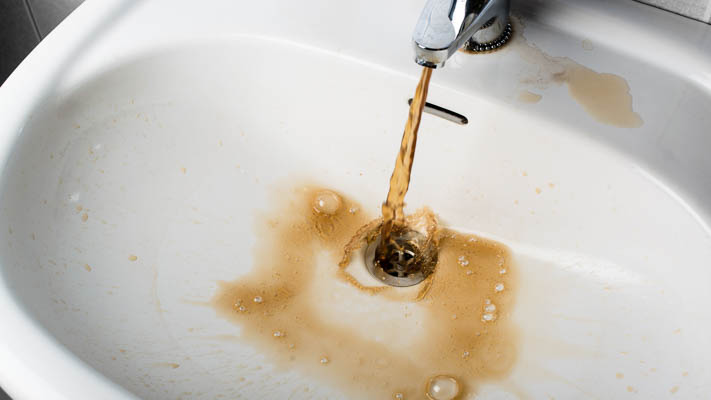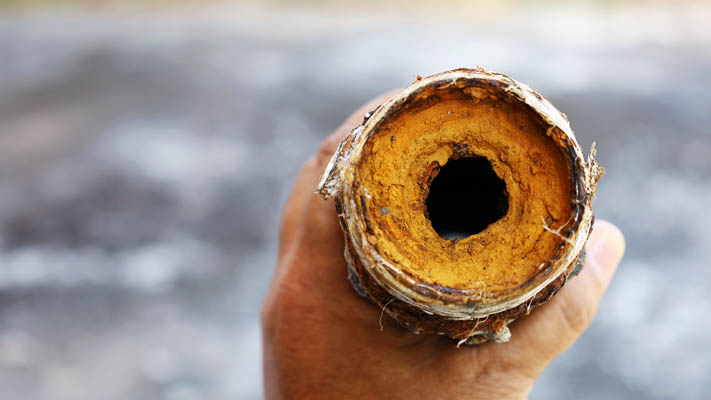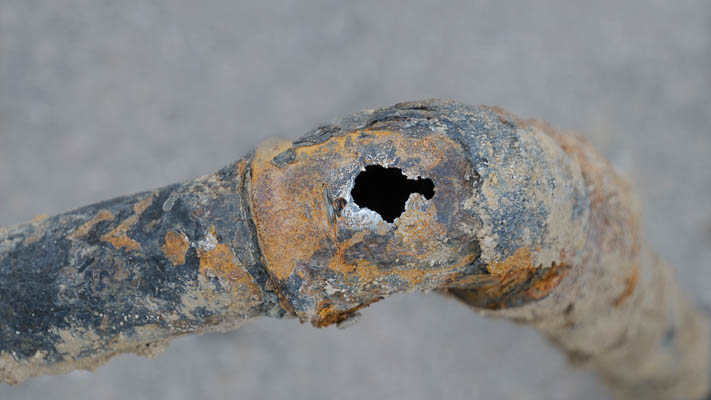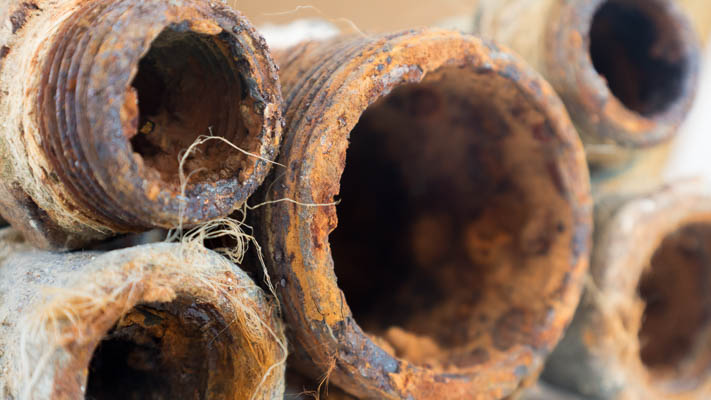What Is Galvanized Piping?
Galvanized steel plumbing consists of steel pipes and fittings coated with zinc through a process known as galvanization. The zinc serves as a protective layer, designed to prevent the rusting of steel (or iron).
As the zinc coating gradually wears off, the underlying steel (or iron) becomes exposed to oxygen and chemicals in the water, leading to the onset of rust that may appear in your drinking water.
In cases where the galvanized pipes are not situated in a damp environment, the exterior of the pipes may remain in excellent condition, even if the interior experiences significant corrosion and rusting.

How To Tell If You Have Galvanized Pipes
Among the various plumbing materials used, only galvanized steel and cast iron (often used for drain and sewer piping) are magnetic. If a strong magnet sticks to a pipe, and it is a water supply line, you are dealing with galvanized steel piping.
Another method is to conduct a scratch test using a screwdriver. If the exterior of the pipe is rusty, galvanized plumbing should reveal a dull gray when you scratch off the rust. If the exterior is already gray, it will remain dull gray.
Why Was Galvanized Piping Used?
In the early 1920s and 1930s, engineers began using galvanized steel pipes as a safer replacement for lead pipes in fresh water plumbing systems. This shift was driven by increased awareness of the health hazards associated with lead.
Galvanized pipes became a more common choice because they were less expensive, more durable, and easier to install and handle compared to the copper tubing available at the time.
Galvanized plumbing was very common in the United States until the 1960s, when it gradually fell out of favor as a preferred plumbing material. It was replaced by copper piping or various types of plastic tubing—such as PEX, along with the now outdated CPVC and polybutylene.
What Are Common Problems With Galvanized Plumbing?
Most galvanized steel pipes used in residential hot and cold water plumbing are at least 40 years old—and in many cases, much older. It's very likely these pipes have reached the end of their expected service life. Outdated galvanized plumbing can lead to several problems, including:
- Rusty and discolored water: As rust and scale within the pipes flakes off, you can often get rusty colored water (or rusty tasting water) at your water outlets.
- Low or unequal water pressure: Internal rust and scale buildup can significantly restrict water flow, resulting in issues with unequal or low water pressure. This restricted flow is typically most noticeable at hot water outlets and outlets furthest from the water supply.
- Water leaks: Corrosion can reach a point where pipes and connections start to fail. Sometimes these leaks can be slow, and go undetected for extended periods, leading to the build-up of mold in wall cavities (requiring expensive and disruptive mold remediation when discovered).

Do Galvanized Pipes Impact Home Insurance?
Galvanized plumbing can affect your ability to get or maintain home insurance. Many insurance providers consider galvanized steel pipes a risk factor due to their age, tendency to corrode, and potential to leak or burst.
Some insurers may:
- Refuse coverage: If your home has galvanized plumbing, certain providers may decline to issue a new policy.
- Limit water damage claims: Coverage exclusions or higher deductibles may apply for damage caused by older plumbing systems.
- Raise your premium: Outdated galvanized pipes are considered a liability, leading to increased premiums or required inspections.
If you're buying or selling a home, galvanized plumbing can also come up during a home inspection and potentially lower the property's value or slow down the sale process. Replacing galvanized pipes with modern materials like PEX or copper can reduce risk, lower premiums, and make your home more insurable.
We have several articles that discuss how galvanized pipes can impact your home insurance. If you're looking for location-specific information, we also have articles focused on Texas, Florida, and Utah.
Do I Need To Replace My Galvanized Pipes?
It's not a matter of if, but when, all your galvanized plumbing will need replacement.
Some homeowners opt for partial repiping and repairs rather than a complete galvanized repiping project. Here at Repipe Specialists, we believe that partial repairs are a short-term solution that will end up costing you more in the long run.

All galvanized piping will eventually require replacement, and doing it gradually over time will be much more expensive than completing the entire job at once. Additionally, a single leak can lead to more water damage than the cost of a full repipe.
Most of our repipes are priced between $4,500 for a smaller home, and up to $15,000 for larger more complex projects. We also offer repipe financing options to help ease the financial burden of unplanned repiping expenses. You can read more about this in our article How Much Does a Whole House Repipe Cost.
Get your free estimate today
With over 75,000 repipes completed, we've perfected our One-Stop Repipe™ for your home.
What Is A Good Replacement For Galvanized Plumbing?
All of our galvanized plumbing repipes use either American L-grade copper piping or Uponor PEX-A tubing, depending on the client's personal preference.
Both PEX and copper have their own distinct advantages and disadvantages. You can learn more by reading our article that compares the pros and cons of copper piping and PEX tubing.
While most of our repipes utilize PEX, if you're still unsure, you can contact us to schedule a free consultation with one of our local repipe consultants.
Receive a Free Quote for Your Galvanized Plumbing Repipe
Here at Repipe Specialists, we've fully replaced galvanized plumbing in thousands of homes since 1991 using both copper piping and PEX tubing. We consistently receive positive feedback from customers about their overall home repipe experience. In fact, we often exceed expectations when it comes to:
- Speed: Our repipe crews typically complete a repipe in a day, returning on another day for wall patching.
- Convenience: Through our One-Stop Repipe™ Process, we handle everything from permits, to wall patching, to inspections.
- Cleanliness: Our crews are trained to protect your home while working (we cover all surfaces with protective sheeting), and to clean up fully at the end of each day.
- Peace of Mind:Repipe Specialists is a fully licensed plumber in every state we operate in, and we back all of our repipes with a lifetime warranty.
- Financing programs: To help take the sting out of unplanned repipe expenses, we offer several financing programs.
- Price: As a specialist that performs hundreds of repipes a week, we can deliver high-quality repipes at a lower cost vs generalist plumbers. We have an article that covers repipe cost factors in detail. Our quotes typically range from $4,500 to $15,000 depending on the size and complexity of your project.
Schedule a free in-home consult, and one of our local repipe consultants will explain all your repipe options and provide you with a written, fixed-price quote. Fix galvanized plumbing issues at the source, repipe now.

